Menstrual Cycle Self-Care + Packing Tips For Female Travelers
Menstrual cycle self-care is about more than what to do during a woman’s period. I’ve broken it down to what to do during each phase of the month(ish)-long cycle because a woman’s body needs different kinds of attention along the way.
Most of what I write is geared toward female travelers but I’m hopeful that men can relate in some way or at least learn something from what I share. If not for themselves then about the women in their lives.
However, this one is about the menstrual cycle, so 1000% for women. I’ve been thinking about this topic for a long time, and I’m happy to finally share it.

Why Am I Writing About My Period?
Well, first of all, it’s something that should be discussed more openly among women and society as a whole. There is a persistent misconception of the menstrual cycle and mistreatment of women worldwide as a result.
Access to period products, menstrual health education, and women’s healthcare is seriously limited in countries around the world. The United States included. To such a degree that the United Nations has deemed it a public health and human rights issue.
Learn more about the mistreatment of menstruating people around the globe in the article “Everything You Need to Know About Traveling on Your Period and Access to Feminine Hygiene Products Around the World” by AnnaMarie Houlis on Wanderful.
Don’t think that the United States is exempt from any of this. Basic menstrual care and products are an afterthought (or just nonexistent) for incarcerated women and homeless women in this country. And low-income menstruators, living paycheck-to-paycheck, are often faced with the decision between paying for basic human needs like food or buying a box of tampons.
Newsflash! Menstrual products are also a basic. human. need.
On a More Personal Note
I have tracked my period for several years as part of my daily practice of self-awareness and self-care. It’s a way to pay closer attention to my body’s needs, reactions, and patterns throughout the month.
After two years of recording symptoms, and reading up on them, I am more aware of exactly what is happening in my body. As a result, I can feel when my period is going to arrive down to the minute. I can also distinguish between symptoms of my menses and other things that may have similar symptoms like my autoimmune disease or depression/anxiety.
Aside from saving my underwear, this also helps me prepare for upcoming trips. Depending on what phase/s of my menstrual cycle I’ll be in when I plan to travel, I know what kind of self-care items to include in my healthy travel kit.
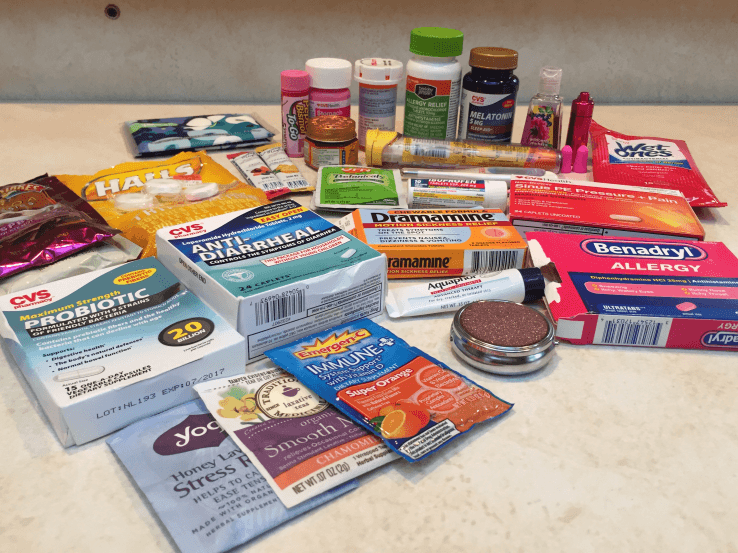
Your Menstrual Cycle is More Than Your Period
Did you catch that “phases of my menstrual cycle” I mentioned above? The menstrual cycle is more than just PMS and blood management. It has several phases and each phase has fluctuating hormones and symptoms that can influence your moods, appetite, and energy levels, which can impact how you travel.
Most advice out there only focuses on travel during your period. I get it, traveling with your period is inconvenient and uncomfortable but it can be just as uncomfortable to travel during other phases, too. After all, if you’re not traveling during your bleeding phase, then you’re traveling during the other phases, right?
Your Menstrual Cycle + Self-Care
Every woman should know the nitty gritty details of their menstrual cycle but I didn’t want to send you off to some page with a clinical description. So, here is my version of what’s going on inside your body. Plus, the symptoms you might experience and some self-care tips to help make them bearable while you travel.
FYI, I’ve used averages because every woman’s cycle is different and symptoms and severity will vary from woman to woman and month to month. Also, I did not include the use of hormonal birth control or additional conditions such as endometriosis.
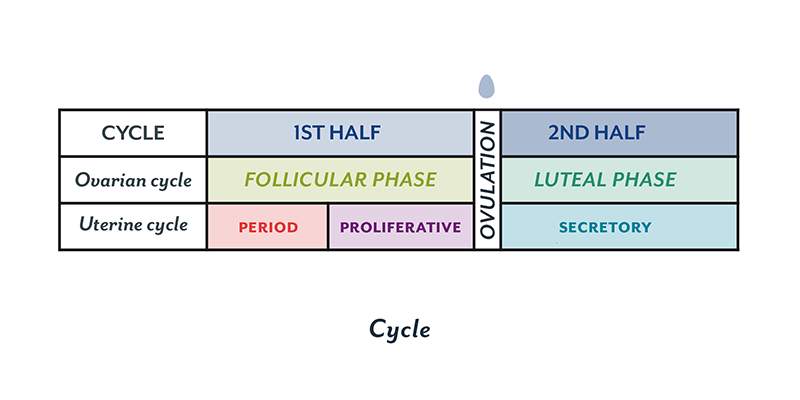
The Menstrual Cycle, According to Me
Your ovaries and your uterus each have their own unique cycles (the ovarian cycle and uterine cycle – imagine that!), which overlap and work together throughout the entire menstrual cycle. Go, team!
Your cycle begins on the first day of your period and ends when your next period begins. On average, this happens every 28 days.
Hormonal changes throughout your cycle send signals between your brain, ovaries, and uterus telling them to do different things – depending on the conditions. These changes are the different phases that I mentioned.
Totally not clinical but does it makes sense? I hope so because I’m about to go into more detail.
First Half of the Menstrual Cycle
A lot is happening during the first two weeks of your cycle.
Uterus: Menstruation + Proliferative Phase
Menstruation marks Day 1 of your cycle. During this time, the thick lining of the uterus, which was prepared to support a fertilized egg, breaks down and sheds from the body. Levels of estrogen and progesterone drop. On average, this phase lasts 3-7 days.
The Proliferative Phase begins when menstruation ends and lasts until ovulation. This is the rebuilding phase when the uterus walls begin to thicken up again as estrogen levels rise.
Ovaries: Follicular Phase
Meanwhile, your ovaries are working hard to produce an egg. To do that, your body releases FSH – the Follicle-Stimulating Hormone. Follicles are those tiny sacs in your ovaries that hold immature eggs.
As the egg matures, a surge of estrogen in your body signals your uterus to recreate that thick, cushy lining in preparation for the egg’s arrival (<– proliferative phase). The average length of this phase is 16 days but can be shorter or longer.
Likely Symptoms
You might experience cramps, headaches, breast tenderness, bloating, diarrhea/constipation, fatigue, lower back pain, irritability, mood changes, etc.
Self-Care Suggestions
During this phase remember to do low-impact physical activities, take fresh air walks, stretch, drink lots of water + herbal tea, maintain a balanced diet, get extra sleep + generally take it easy, use a hot compress for cramps + back pain, and take ibuprofen for intense cramps.
Don’t Forget to Pack
Your walking shoes, extra underwear, tampons, pads, or menstrual cup, hand sanitizer, water bottle or hot water bottle, herbal tea bags, Smooth Move tea bags, ibuprofen.
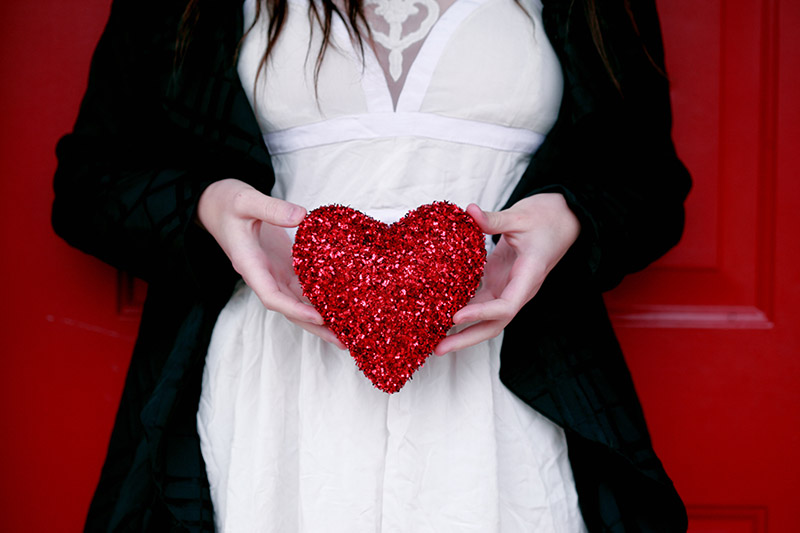
Mid-Cycle: Ovulation
Ovulation is when a mature egg is finally released from the ovaries and travels through the fallopian tube to the uterus. This happens after the rising estrogen levels in your body trigger the release of the LH – Luteinizing Hormone.
Ovulation happens right in the middle of your cycle, so on days 13-15 for the average 28-day cycle. It lasts just 24 hours and is the ONLY time that you can get pregnant.
Likely Symptoms
Many women experience an increased sex drive (or thinking every man you see is attractive – this is just your body playing tricks on you!), heightened sense of smell (to find those pheromones!), slight rise in body temperature, slight cramping or pain on the side where the egg was released, bloating, breast tenderness, light spotting, etc.
Self-Care Suggestions
If you aren’t trying to get pregnant, use protection when you have sex. Remember that sperm can live inside your body for up to 5 days. So, if you have unprotected sex during the 5 days before you ovulate, you can get pregnant.
If you experience ovulation pain use a hot compress, drink herbal tea, and take ibuprofen if it’s really bad.
Don’t Forget to Pack
Bring your favorite condoms or other non-hormonal birth control, herbal tea bags, hot water bottle, ibuprofen/.
Second Half of the Menstrual Cycle
These two phases occur simultaneously and last an average of 14 days. This is when you experience symptoms of PMS and, from my personal experience, is the time with the most potential to derail travel plans. Thankfully, by thinking ahead and packing the self-care items to help make you feel better, your travels can go smoothly during this phase.
Ovaries: Luteal Phase
After you ovulate, progesterone and estrogen spikes, which keeps the lining of your uterus thick and ready to take care of a fertilized egg. If one happens to make its way there.
Uterus: Secretory Phase
However, if a fertilized egg does not reach the uterus, your body gets ready to start the whole process over again. To do that, estrogen and progesterone decrease and your uterus will secrete chemicals called prostaglandins. This triggers the thick uterine lining to break down and the uterine muscle to contract. If you get cramps during your period, this is what’s making them happen.
Likely Symptoms
Dramatic fluctuations in hormone levels can cause mood swings, or cause you to feel irritable, sad, depressed, confused, etc. Also, headaches, insatiable hunger, food cravings, sensitivity to alcohol and caffeine, water retention, bloating, fatigue, nausea, acne, breast tenderness + swelling, etc.
Also, the severity of autoimmune disease symptoms can increase during this time.
Self-Care Suggestions
Try to avoid sugar, caffeine, and salty, smoked, or fried foods, do breathing exercises or meditate, low-impact physical activities like yoga or fresh air walks, take a hot bath, pamper yourself, do things you enjoy (to improve your mood), drink plenty of water + herbal tea, get extra sleep, carry healthy snacks.
Don’t Forget to Pack
Bring your comfortable walking shoes, comfy clothes, water bottle, herbal tea bags, face mask, bath bomb, your favorite downtime activity. I make sure to bring my Kindle Fire so I can watch sitcoms or funny movies and my earbuds to listen to my favorite playlists, podcasts, or audiobooks.
Hopefully, you now have a better understanding of your menstrual cycle and feel inspired to begin a daily practice of self-awareness and self-care. Tracking your period symptoms is a great self-awareness activity. Remember, my self-care suggestions can be used at home as well as on the road.
SAVE THIS POST FOR LATER!
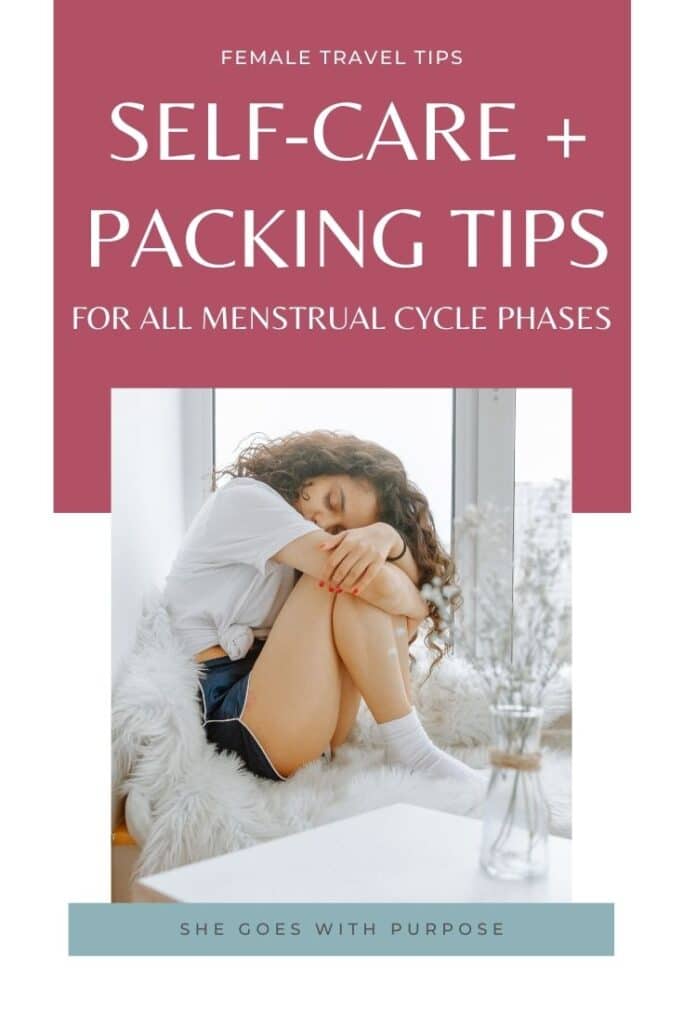
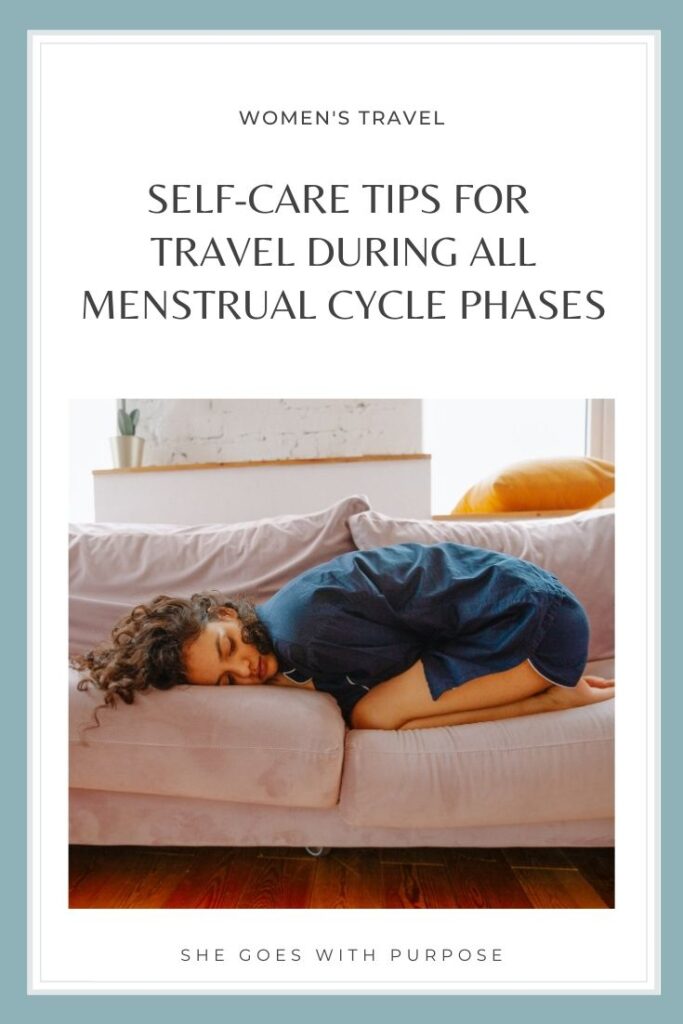
- Like
- X
- Digg
- Del
- Tumblr
- VKontakte
- Buffer
- Love This
- Odnoklassniki
- Meneame
- Blogger
- Amazon
- Yahoo Mail
- Gmail
- AOL
- Newsvine
- HackerNews
- Evernote
- MySpace
- Mail.ru
- Viadeo
- Line
- Comments
- Yummly
- SMS
- Viber
- Telegram
- Subscribe
- Skype
- Facebook Messenger
- Kakao
- LiveJournal
- Yammer
- Edgar
- Fintel
- Mix
- Instapaper
- Copy Link
Totally agree: this topic should not be a taboo.